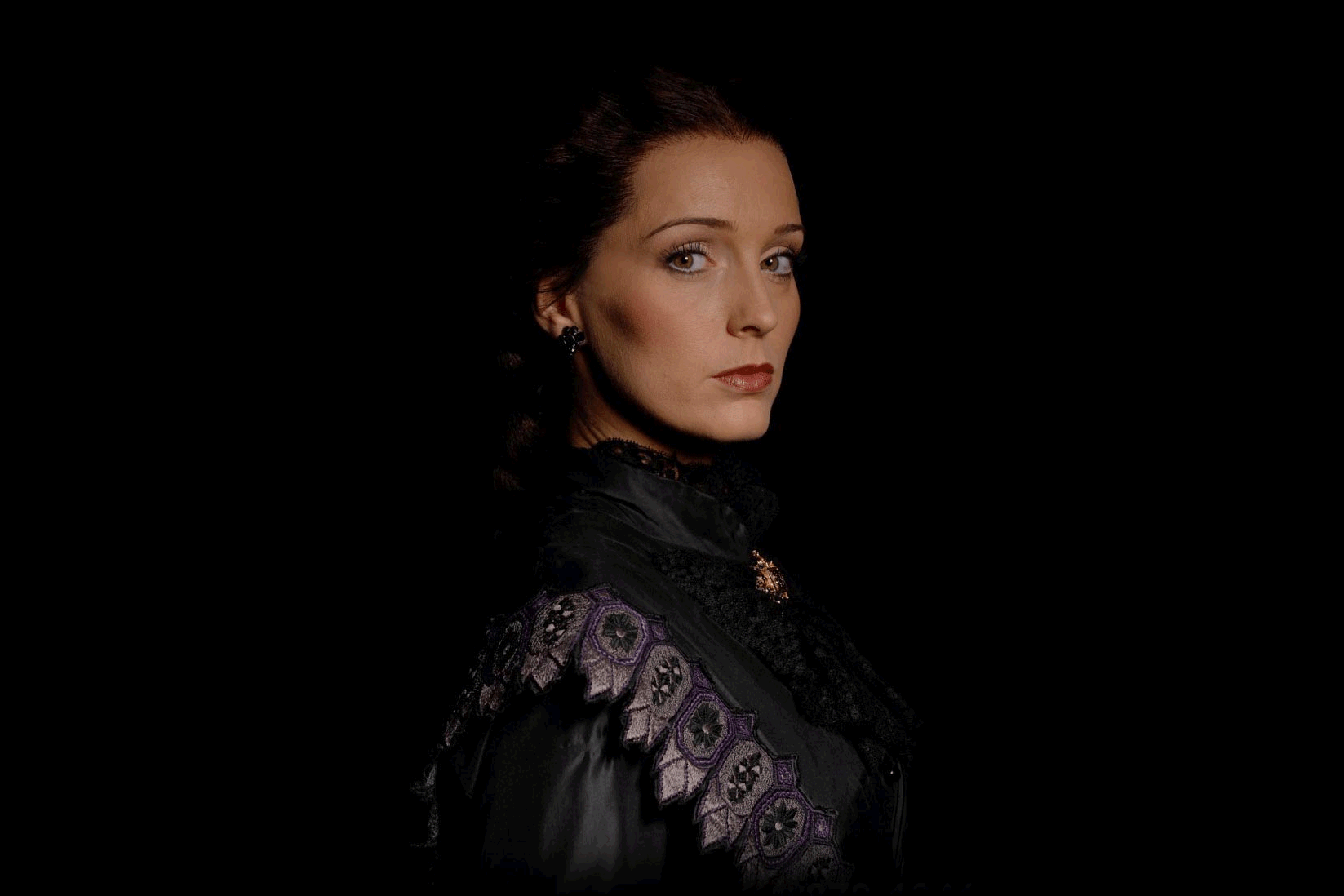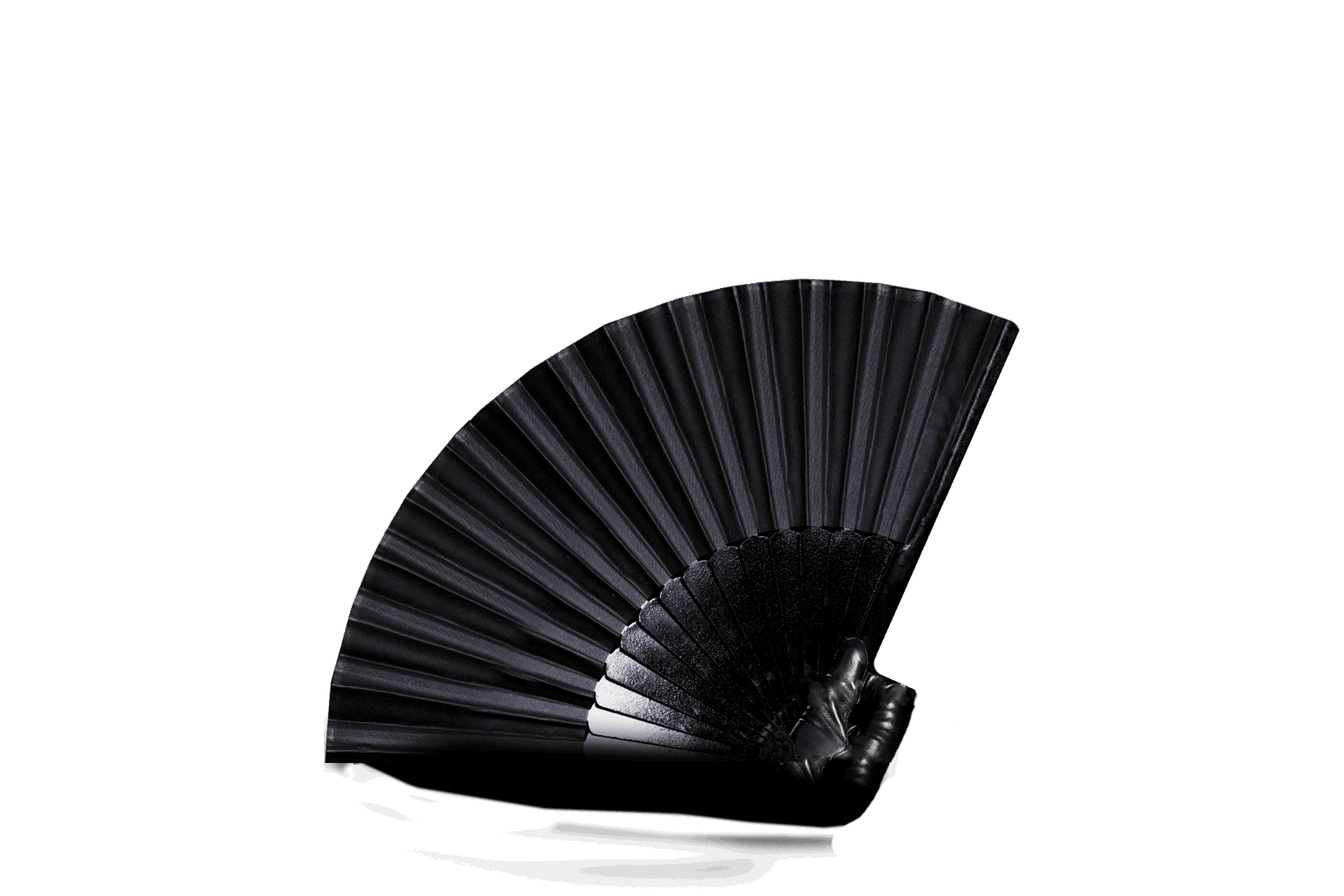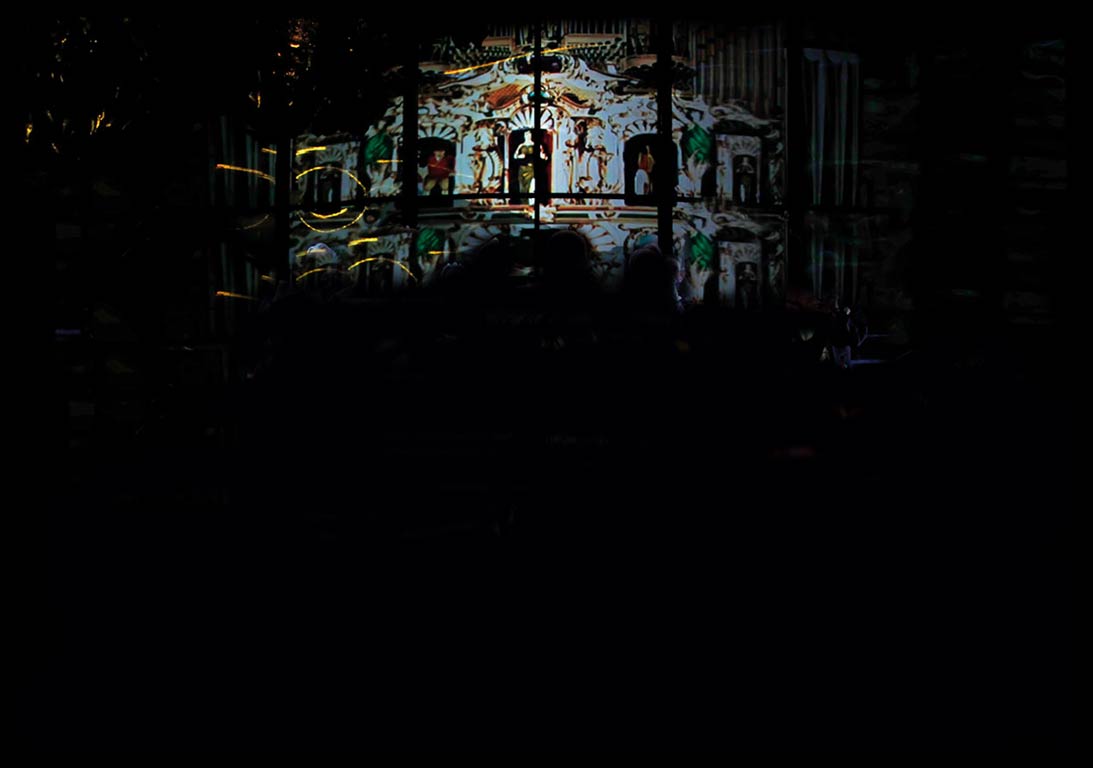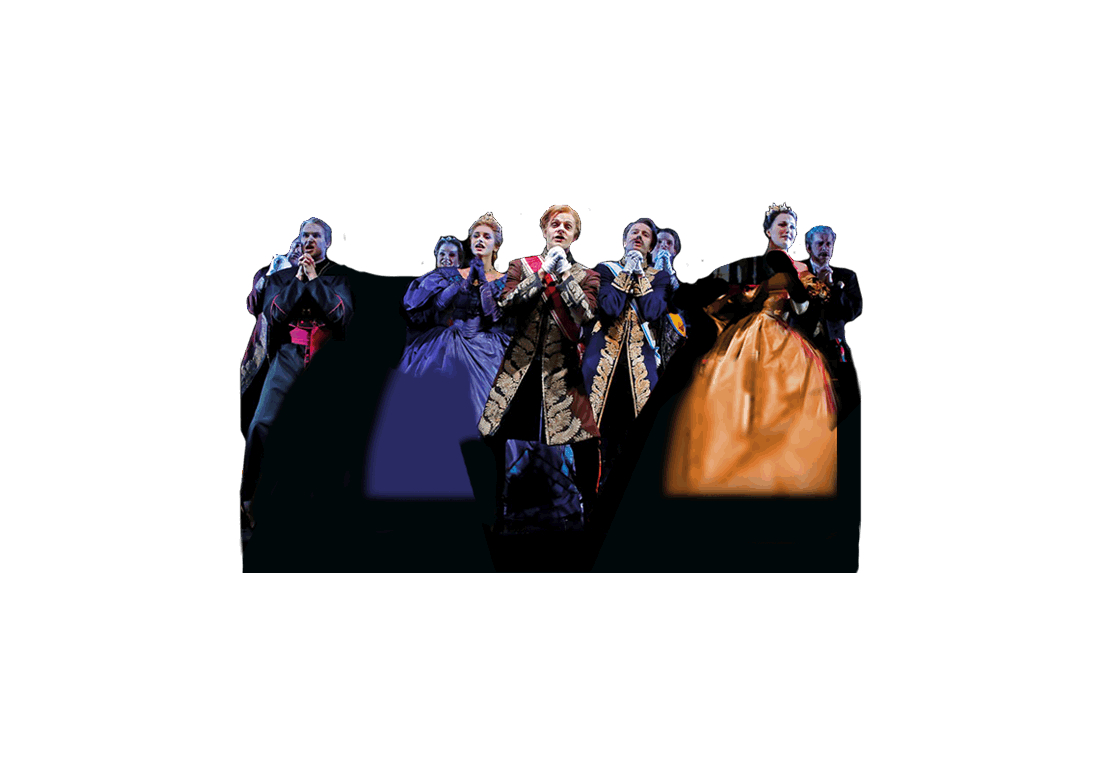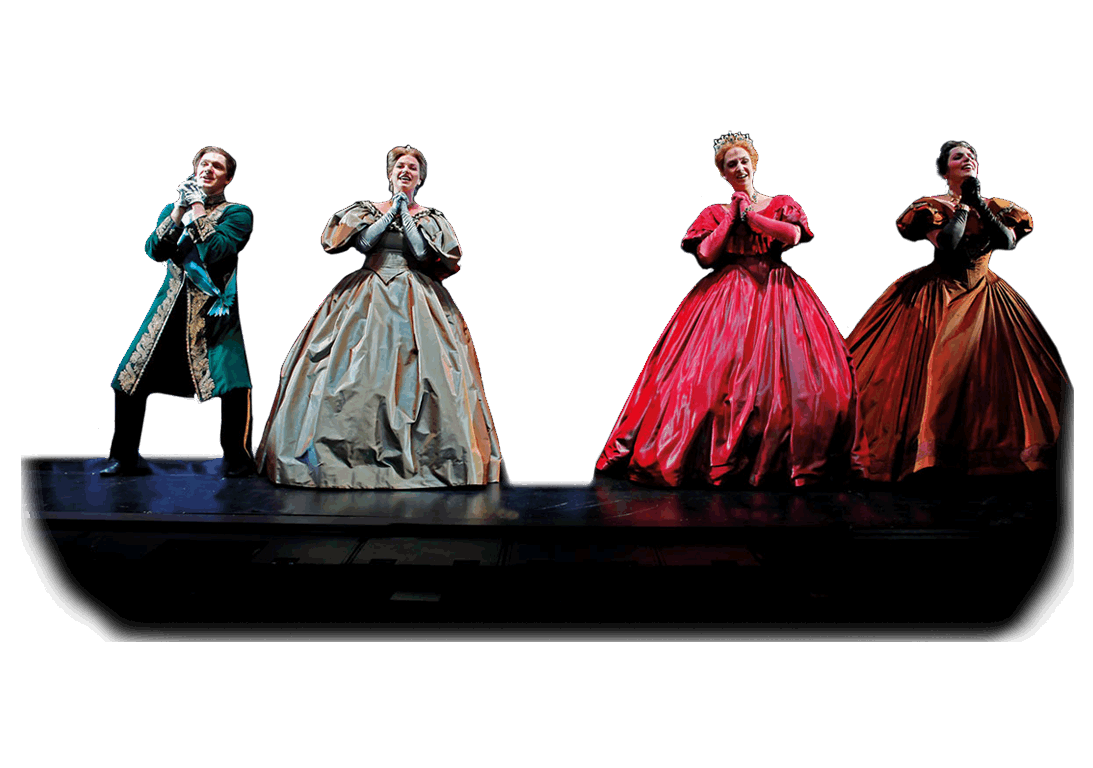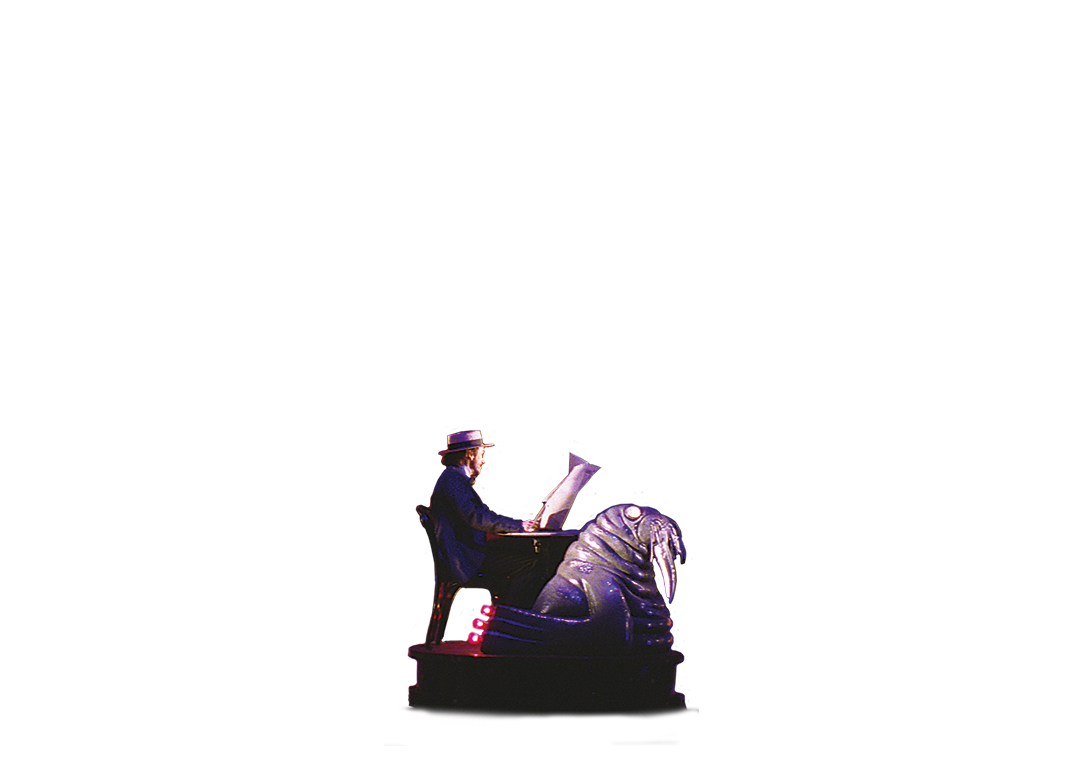Additional Tracks
Full musical soundtrack CDs available on request. Please contact us for our promotion packages.
Introduction
Based on the tragic fate of legendary Austrian Empress Elisabeth – the mythical and celebrated “Sisi” – and told from the mouth of her convicted murderer, ELISABETH recounts the enthralling tale of her fatal, lifelong love affair with Death, heralding the decline of the Habsburg Empire.
For more than three decades now, ELISABETH has been playing in a class of its own: since its world premiere in 1992 at Vienna’s Theater an der Wien, almost ten million people worldwide have seen the solitary, mythical Austrian Empress in her dramatic struggle for love, liberty and, at long last, a redeeming death.
But what makes ELISABETH so extraordinary is not only the fact that this remarkable production by VBW ranks unchallenged as the most successful, record-busting German-language musical of all time. It is also the fact that ELISABETH to this day is a truly touching, riveting and strikingly contemporary portrait of a woman far ahead of her time in her quest for self-awareness and self-fulfillment, dreadfully suffering from being born in the wrong era and the wrong surroundings.
By no means just another romantic continuation of the prevalent and one-dimensional “Sisi myth,” ELISABETH paints an entirely different and therefore even more relevant picture of its enigmatic and ambiguous protagonist. By focussing on Elisabeth’s struggle against the stifling constraints of imperial protocol, her determination to assert her own identity, her reaction to the tragic fate of her son, Rudolf, and her morbidly romantic, lifelong love affair with Death – who is here presented as a dashing and darkly charming seducer – writer Michael Kunze and composer Sylvester Levay have innovatively introduced an exceptional measure of emotional depth and significant meaning into the musical genre, thereby creating an entirely new form of European musical theater: the drama musical.
Yet ELISABETH would not be truly one of a kind if the musical were only dealing with the dark shadows of its troubled heroine’s soul. A moving musical score, stunning choreography and lavish sets bring the pomp and intrigues of the Austrian imperial court back to spectacular life, allowing the audience to rediscover the historical world of the Habsburgs in a captivating way. Empress Elisabeth, her husband Emperor Franz Joseph, her mother-in-law Archduchess Sophie and her son Crown Prince Rudolf re-enact their historical roles in a way that is sometimes tenderly romantic, often intense, sometimes grotesque, but always enthralling. An impressive, bittersweet swan song not only for its protagonist but also for a bygone, magnificent era on the verge of its decline.
Critically acclaimed as a benchmark of the musical genre and “the rebirth of European musical theater” (The European, London), ELISABETH is an engrossing dance of death – and with Death – on the deck of the sinking ship of the Habsburg Monarchy.
Success Story & Production Notes
Over 12,7 million tickets sold worldwide
Performances in 14 countries and 10 languages
“A benchmark of musical theater”
The original 1992 Vienna production of ELISABETH, directed by the world-renowned music theater director Harry Kupfer and choreographed by Dennis Callahan, was revived in October 2003 and ran until December 2005 in Vienna and again in Vienna from 2012 until 2014.
This production uses a stage with a revolving section (17.5 m in diameter) that allows internationally acclaimed set designer Hans Schavernoch to present a vivid array of scenes from late 19th-century Viennese life, such as the Emperor’s Court, a Viennese coffee-house and typical street scenes, a house of ill repute and an asylum for the insane.
Choreographer Dennis Callahan makes full use of the technical possibilities in the stunning dance routines, not least in the opening number when Elisabeth’s dead contemporaries emerge from the night-world of the dead and the dreamers.
During the fourth of the original six seasons in Vienna (1992 – 1998) the first international production of ELISABETH opened in Takarazuka, Japan in 1996 and in Tokyo a few months later. Since then the spectacle has proved a huge draw in Belgium, China, Czech Republic, Finland, Germany, Hungary, Italy, Japan, Lithuania, Netherlands, South Korea, Sweden and Switzerland.
Press Review
-
“The through-composed score contains a lot of romantic pop ballads redolent of Andrew Lloyd-Webber, but its wry parodies and stirring choral ensembles raise it above the generic. Think of it as the Austrian EVITA. Never less than entertaining, ELISABETH packs a cumulative emotional punch, an effect which stems from basic, good storytelling.“
-
“Elisabeth – propelled Vienna into the premier league of musical cities.“
Credits & key facts
- World Premiere:
1992 Austria / Vienna (Theater an der Wien/VBW)
- Book & Lyrics:
Michael Kunze
- Music & Orchestrations:
Sylvester Levay
- Director:
Harry Kupfer
- Choreographer:
Dennis Callahan
- Set Design:
Hans Schavernoch
- Costume Design:
Reinhard Heinrich (1992, 2003), Yan Tax (2012)
- Lighting Design:
Hans Toelstede (1992, 2012), Andrew Voller (2003)
- Sound Design:
Erich Dorfinger (1992, 2003), Thomas Strebel (2012)
- Video Design:
Thomas Reimer (2012)
- Visitors worldwide:
over 12,7 million
- Shows worldwide:
over 9.600
- Countries:
Austria, Belgium, China, Czech Republic, Finland, Germany, Hungary, Italy, Japan, Lithuania, Netherlands, South Korea, Sweden, Switzerland
- Language versions:
Czech, Dutch/Flemish, Finnish, French, German, Hungarian, Japanese, Lithuanian, Korean, Swedish
Main Characters
-
ELISABETH
Elisabeth, wife of Emperor Franz Joseph I, Empress of Austria and Queen of Hungary, is presented as a strong-willed, freedom-loving and beautiful woman. She refuses to let herself be shackled by the constraints of court life. In a bid to flee her dull existence, she seeks the ultimate thrill and repeatedly flirts with Death. Her struggle for independence shows her to be a woman born before her time. Later she becomes increasingly self-absorbed and travels ceaselessly, neglecting her duties and her son. When Death finally embraces her, her longing is satisfied at last.
-
DEATH
Presented as Elisabeth’s dark and seductive lover, Death is a dashing and sensual young man by appearance who is fascinated by the Empress just as she is by him. He admits that he loves her but initially rejects her advances, taking instead her infant daughter and befriending her young son, Rudolf. Rebuffed in turn by Elisabeth, Death incites Rudolf to oppose his father, which ultimately leads to the former’s suicide. This breaks Elisabeth utterly and her longing for Death becomes overpowering. Assured of his ultimate victory, Death allows ten more years to pass before finally taking pity and embracing her.
-
EMPEROR FRANZ JOSEPH I.
Elisabeth’s husband and Emperor of Austria, Hungary and Bohemia. Initially dominated by his mother, Archduchess Sophie, he is a stern and reserved man, conservative, close-minded and uncompromisingly devoted to his royal duties from a young age. Still, he also genuinely loves Elisabeth and eventually yields to her will. However, he must realize that he cannot make her happy and as a result is tormented by longing and remorse. He blames his mother for ruining his marriage and makes several futile attempts to save his relationship to Elisabeth. In the end, he is forced to accept the bitter truth that he has not only failed to regain Elisabeth’s heart but also to save her life.
-
LUIGI LUCHENI
Elisabeth’s murderer is a young man from a poor backgrounds, driven by fanaticism and hate for the privileged classes. He is presented as a sarcastic, cynical and sometimes even manic narrator leading through the plot. Addressing the audience directly, he exposes Elisabeth’s egotistical character traits and questions the masses’ uncritical devotion to her. He claims that her restless desire to travel is nothing but a futile attempt to escape her fear of ageing and that her political support of Hungary will lead to the Monarchy’s decline. He also intervenes in the plot, fanning the flames of revolution by blaming Elisabeth to cause an acute milk shortage for the population by her luxurious habit of taking frequent milk baths.Elisabeth’s murderer is a young man from a poor backgrounds, driven by fanaticism and hate for the privileged classes. He is presented as a sarcastic, cynical and sometimes even manic narrator leading through the plot. Addressing the audience directly, he exposes Elisabeth’s egotistical character traits and questions the masses’ uncritical devotion to her. He claims that her restless desire to travel is nothing but a futile attempt to escape her fear of ageing and that her political support of Hungary will lead to the Monarchy’s decline. He also intervenes in the plot, fanning the flames of revolution by blaming Elisabeth to cause an acute milk shortage for the population by her luxurious habit of taking frequent milk baths.
-
ARCHDUCHESS SOPHIE
The Emperor’s mother and Elisabeth’s mother-in-law, she is initially the power behind the throne, guiding her son with an iron hand and rigidly adhering to the rules of courtly protocol. She vehemently opposes his choice of wife, alienates Elisabeth’s children from their mother and plots unsuccessfully with her entourage to break Elisabeth’s hold on the Emperor.
-
CROWN PRINCE RUDOLF
Emperor Franz Joseph’s and Elisabeth’s hapless and sensitive only son first appears as a little boy, lonely and calling for his absent mother. Death, Elisabeth’s mysterious suitor, seems to be his only friend. The adult Rudolf is incited by Death to declare his political opposition to his father. Hounded on all sides and with no allies, Rudolf finally sees no choice but to commit suicide with his lover, Mary Vetsera.
-
DUKE MAX OF BAVARIA
Elisabeth’s father and husband of Duchess Ludovika of Bavaria. Much like his beloved daughter, he is a freedom-loving and unconventional character, a charming free spirit who himself spent much of his youth traveling, constantly on the run from everything that looked remotely like official duties and avoiding the constraints of the royal court wherever he could.
-
DUCHESS LUDOVIKA OF BAVARIA
Elisabeth’s mother, wife of Duke Max of Bavaria and daughter of the Bavarian King Maximilian I. Contrary to her husband, she is much more inclined to the superficial glamour of aristocratic life, yet she is a loving mother to Elisabeth and her older sister, Helene, dutifully and actively devoted to her children.
Synopsys
„The world is a ship. And the ship is sinking.“
-
ACT I
A fateful choice
One hundred years after the event, Elisabeth’s assassin, Luigi Lucheni, is being cross-examined by an invisible judge. Leading through the musical’s plot as a vibrant and sardonic narrator, Lucheni claims his murder of Elisabeth was only what she herself had longed for. He summons their dead contemporaries as his witnesses and starts to recount the story of a haunting love affair: the fatal romance between Elisabeth and Death.
The 15-year-old Princess Elisabeth would rather ride the horses and climb mountains than attend social functions. At one such gathering, her mother announces that Elisabeth’s elder sister, Helene, is to marry the young Emperor Franz Joseph. The tomboyish Elisabeth shocks the aristocrats with her antics, performing a circus act during which she falls and encounters Death for the first time, who is presented as a seductively attractive and darkly charming young man.
Franz Joseph meets Helene, his intended wife, at his summer residence Bad Ischl but instead falls in love with her sister Elisabeth. His strict and domineering mother, Archduchess Sophie, is horrified. Commenting on the events, Lucheni makes a somber prophecy: Franz Joseph’s love for Elisabeth will bring about the end of the Habsburg Empire.
Trapped and liberated
Following her wedding, Elisabeth soon feels stifled in the straitjacket of court life and smothered by her despotic mother-in-law, Archduchess Sophie. The couple’s first child, named Sophie after her Grandmother against Elisabeth’s will, is taken away from her by the Archduchess and soon claimed by Death. The Archduchess also keeps Elisabeth from having any contact with her son, Rudolf, who, also against her will, is designated for a soldier’s career.
Eventually, Elisabeth presents her husband with an ultimatum, insisting on her right to educate her children herself. The Emperor yields, and Elisabeth wins in the power struggle against her mother-in-law. She sings “I Belong To Me” as a passionate declaration of her refusal to be dependent on anyone, and even rejects Death.
-
ACT II
Triumph and withdrawal
Elisabeth’s political support of Hungary in the country’s fight for independence is her greatest triumph. But Lucheni predicts that these events will initiate the decline and collapse of the Habsburg Empire. At least temporarily, Elisabeth also triumphs over Death, proclaiming that she will dance her last dance only when she is ready. She withdraws into splendid isolation, neglecting her duties and her son, Rudolf. In her place, Death steps in and befriends the lonely little boy. In an effort to break Elisabeth’s hold on the Emperor, Sophie and her entourage send a prostitute to seduce him.
Death continues his advances to Elisabeth and, to prove the Emperor’s infidelity, tells her that her husband has passed on a venereal disease to her. But again, Elisabeth resists his temptation, regarding this incident as her final liberation from all obligations.
United at last – with Death
Travelling restlessly around Europe, Elisabeth hardly ever visits her residence in Vienna. In her absence, Death incites the now adult Rudolf to politically oppose his father and a dispute ensues. The pressure exerted upon Rudolf becomes unbearable. Isolated and desperate he turns to his mother for help, but she refuses to support him. Bereft of his last hope, he sees no other choice but to commit suicide.
Devastated, Elisabeth realizes that her quest for independence and selffulfillment has taken her too far. Now, she is finally ready to meet Death. But in a chivalrous move, Death refuses to triumph over the weakened Empress: he wants her to be strong when he takes her. In a last attempt to save his failed marriage, Franz Joseph tries to persuade the aimlessly wandering Elisabeth to return back to Vienna. But she refuses, arguing that some wounds even love cannot heal.
A decade later, Death finally takes pity on Elisabeth and the final dance begins. In a nightmarish vision, Franz Joseph sees the fall of the House of Habsburg. He now meets his invincible rival for the first time and tries to save Elisabeth, but Death throws the murder weapon, a file, to Lucheni. Lucheni ends his tale by describing how he attacked the Empress on the shore of Lake Geneva. Elisabeth finally submits to her yearning and enters a passionate embrace with Death.


